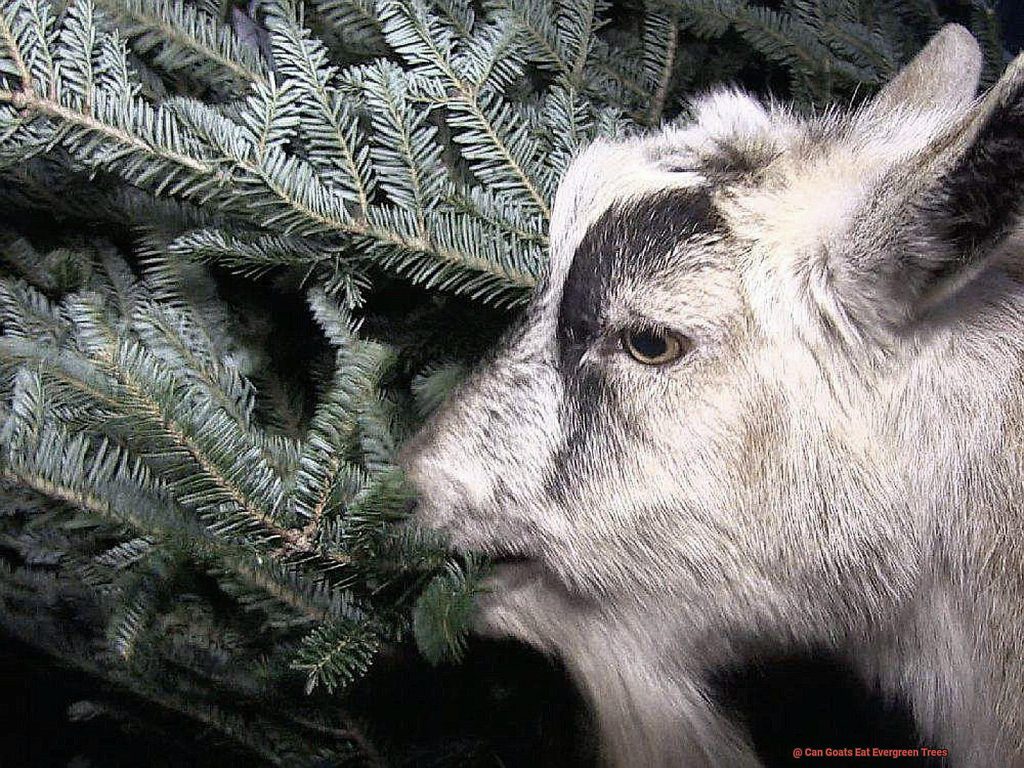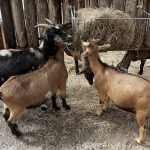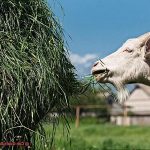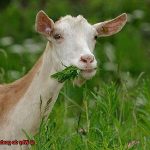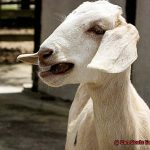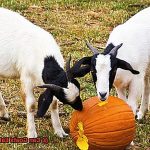Are you a goat enthusiast, farmer or homesteader?
If yes, then you might be pondering whether evergreen trees are safe for your caprine friends to devour. Evergreens are ubiquitous in rural areas and it’s natural to wonder if they can benefit your goats’ health.
While goats are known for their adventurous taste buds and ability to eat almost anything, not all plants are created equal. Some can be toxic or even fatal to your goats.
So, the question arises – can goats eat evergreen trees? The answer is not as straightforward as a simple yes or no.
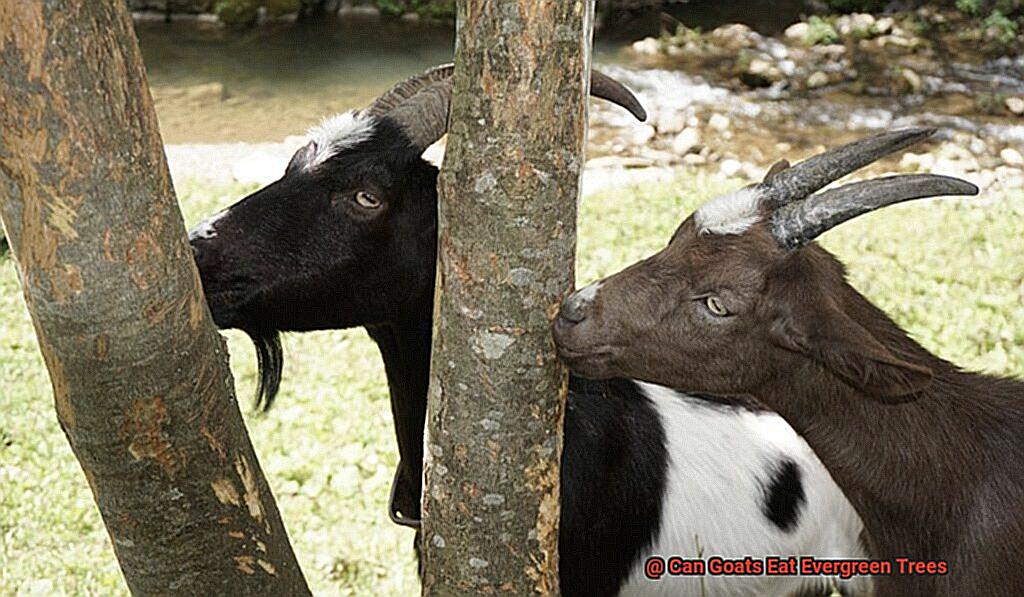
Evergreens such as pine, spruce, and fir have medicinal properties and are often used for their rich vitamin C content found in their needles. However, feeding your goats large amounts of evergreen needles should be avoided as this could lead to digestive issues such as diarrhea or even death.
In this blog post, we’ll delve into the topic of whether goats can eat evergreen trees in more detail. We’ll explore the nutritional value of evergreens, potential risks associated with feeding them to goats, and how you can safely incorporate them into your goat’s diet.
So sit tight with a cup of coffee and let’s explore the world of goats and evergreen trees together.
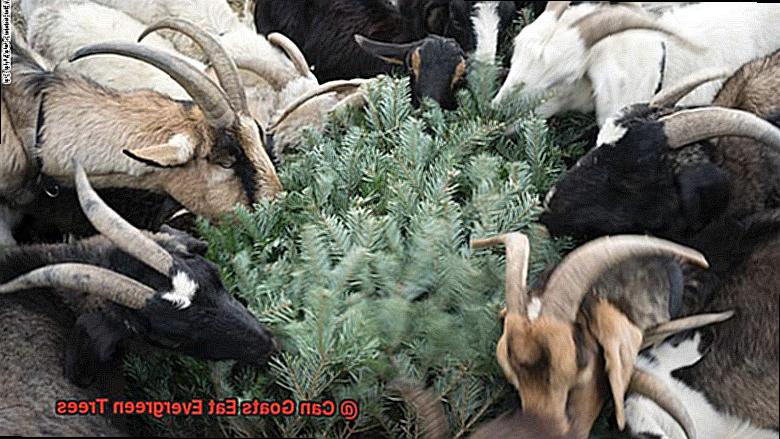
What Are Evergreen Trees?
Contents
These magnificent trees are a type of tree that retains its leaves or needles year-round, unlike deciduous trees that shed their foliage in the fall.
This means that evergreen trees provide a constant source of greenery and shelter for animals throughout the year, including goats. Evergreen trees come in various species and can be found all over the globe, from the pine forests of North America to the eucalyptus groves of Australia.
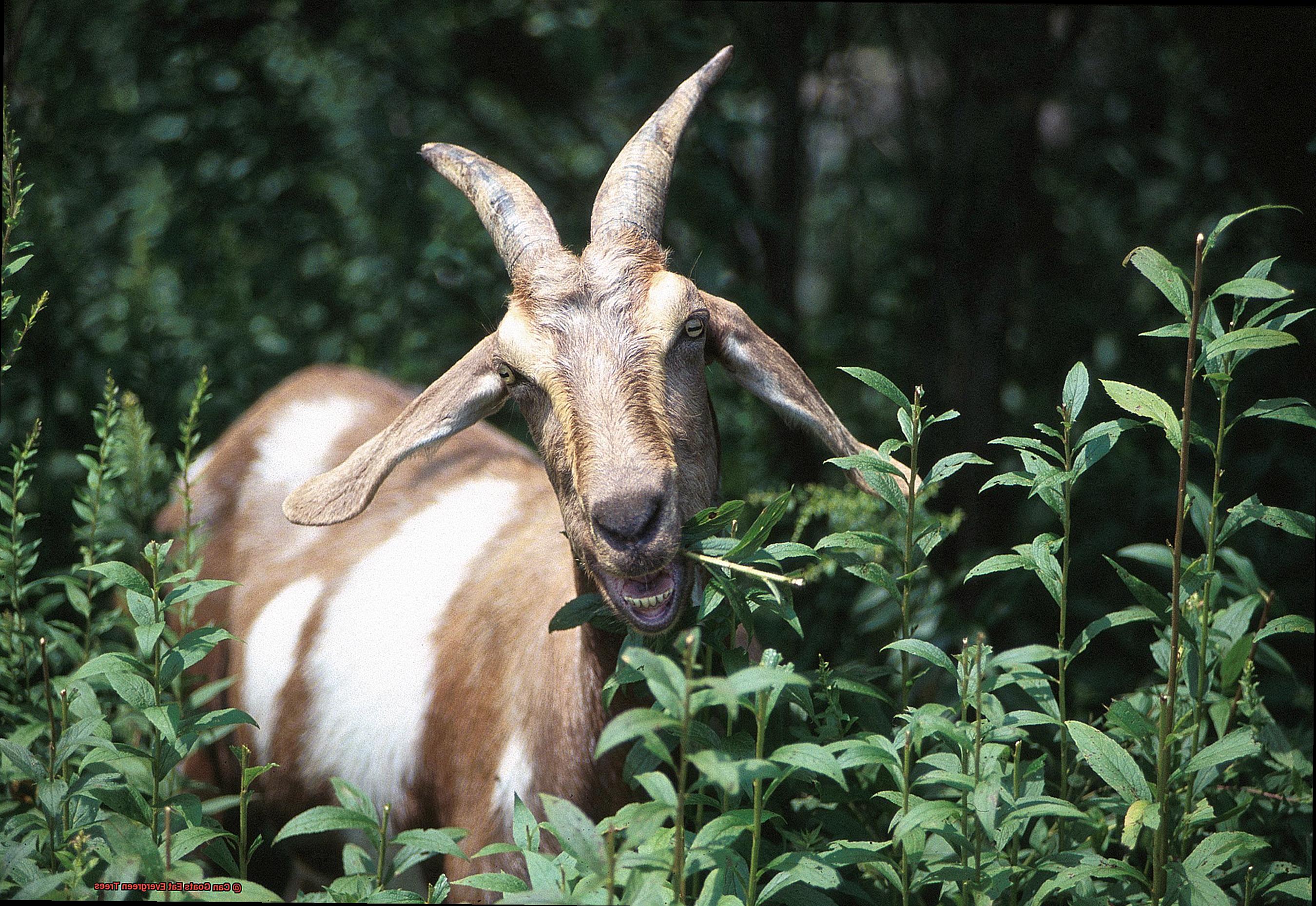
Some of the most common types of evergreen trees include pine, spruce, fir, cedar, and cypress trees. Though these trees vary in size and shape, they all share the ability to retain their foliage year-round.
Now you may ask yourself – how are evergreen trees significant for goats? Well, the needles and leaves of evergreen trees are rich in nutrients and can provide valuable nutrition for goats during the winter months when other food sources may be scarce.
Pine and fir trees, in particular, are generally safe for goats to eat in moderation and provide a good source of roughage for our furry friends.
However, it’s crucial to note that not all evergreen trees are safe for goats to eat.
Certain species contain toxins that can be harmful or even fatal if ingested in large quantities. For instance, Yew trees contain a poisonous alkaloid that can cause sudden death in goats.
Therefore, it’s essential for goat owners to know which evergreen trees are safe and which ones should be avoided. It’s best to limit the amount of evergreen trees that goats have access to and ensure other sources of food are available.
Additionally, it’s crucial to monitor your goats’ behavior and health carefully if they do consume evergreen trees as some animals may be more sensitive or susceptible to the toxic compounds found in certain species.
So, evergreen trees can be a valuable source of nutrition for goats during the winter months.
Are Evergreen Trees Safe for Goats to Consume?
It’s important to understand that not all evergreen trees are created equal.
Some species can be highly toxic and even deadly to goats if they ingest them in significant quantities. For example, yew trees are one of the most toxic evergreens and can cause sudden death in goats within 15 minutes of consumption.
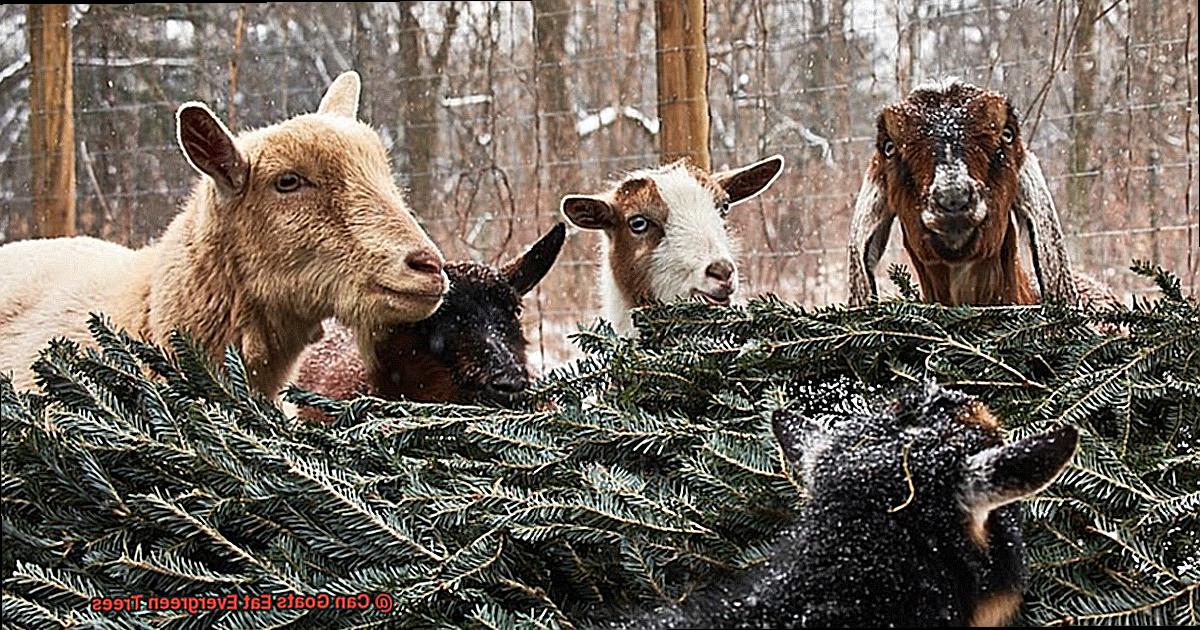
Similarly, hemlock and pine trees can also be harmful if eaten in large amounts. However, there are some evergreen trees that are generally safe for goats to consume in moderation.
Cedar and juniper are two examples of safe species, but it’s still important to keep an eye on the amount of consumption as overeating can lead to digestive issues. To ensure the safety of your goats, it’s crucial to research the specific type of evergreen tree before allowing access.
This will help you determine whether the tree is safe or not. Additionally, it’s essential to watch your goats after they have consumed any part of an evergreen tree and seek veterinary care immediately if you notice any symptoms of toxicity.
Always research the specific type of evergreen tree, monitor consumption, and seek veterinary care if necessary.
Yew Trees and Poisonous Alkaloids
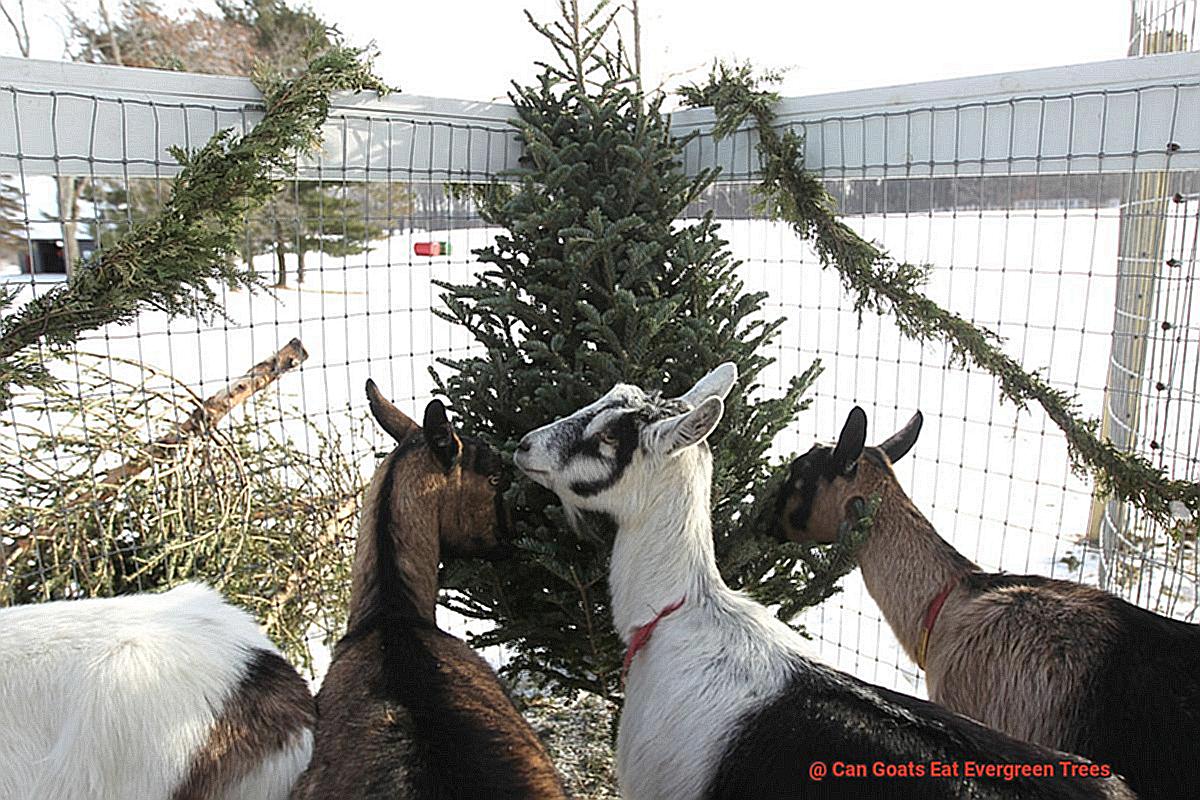
While not all evergreen trees are toxic to goats, there is one in particular that you should watch out for: the yew tree.
Yew trees are known for their toxicity due to the presence of taxine – a type of alkaloid that can cause severe symptoms in both humans and animals if ingested. These alkaloids are highly toxic and can lead to vomiting, diarrhea, abdominal pain, and even death if ingested by goats.
Even though goats are generally considered more resistant to the toxic effects of yew trees than other animals like horses or cattle, it’s still not worth taking the chance. No part of the yew tree – foliage, bark, or berries – should be fed to your goats under any circumstances.
It’s crucial to ensure that there are no yew trees growing in areas that your goats may have access to. Regularly inspecting your pastures and grazing areas and removing any yew trees you find is one of the most important things you can do to keep your goats safe.
Pine and Fir Trees: Nutritious and Safe
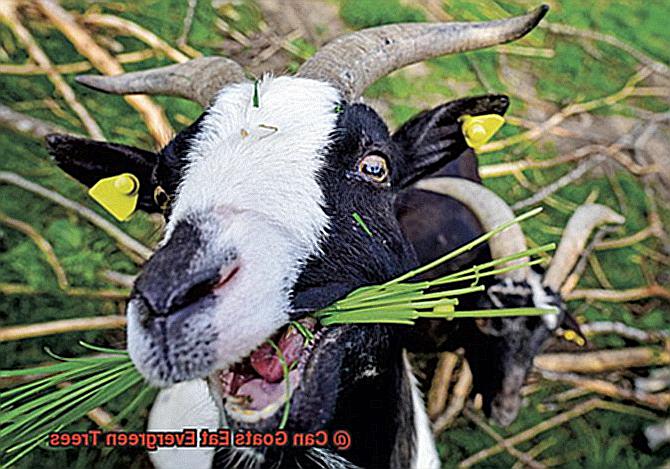
These evergreens are packed with essential nutrients that are crucial to the health of your furry friends. One of the most significant benefits of pine and fir trees is their high levels of Vitamin C. This vitamin is essential for your goats’ overall health and well-being.
Additionally, these trees are rich in fiber, which helps keep their digestive system healthy and functioning correctly. It is important to note that while some evergreen trees can be toxic to goats, pine and fir trees are completely safe for them to eat.
However, it is crucial to ensure that your goats only consume these trees in moderation. Overconsumption can lead to digestive issues such as bloating and diarrhea.
When sourcing pine or fir trees for your goats, make sure they have not been treated with any chemicals or pesticides. These harmful substances can cause serious health problems for your furry friends.
It is always best to obtain these trees from a trusted organic source. Introducing pine and fir trees to your goat’s diet can be a fun and healthy treat.
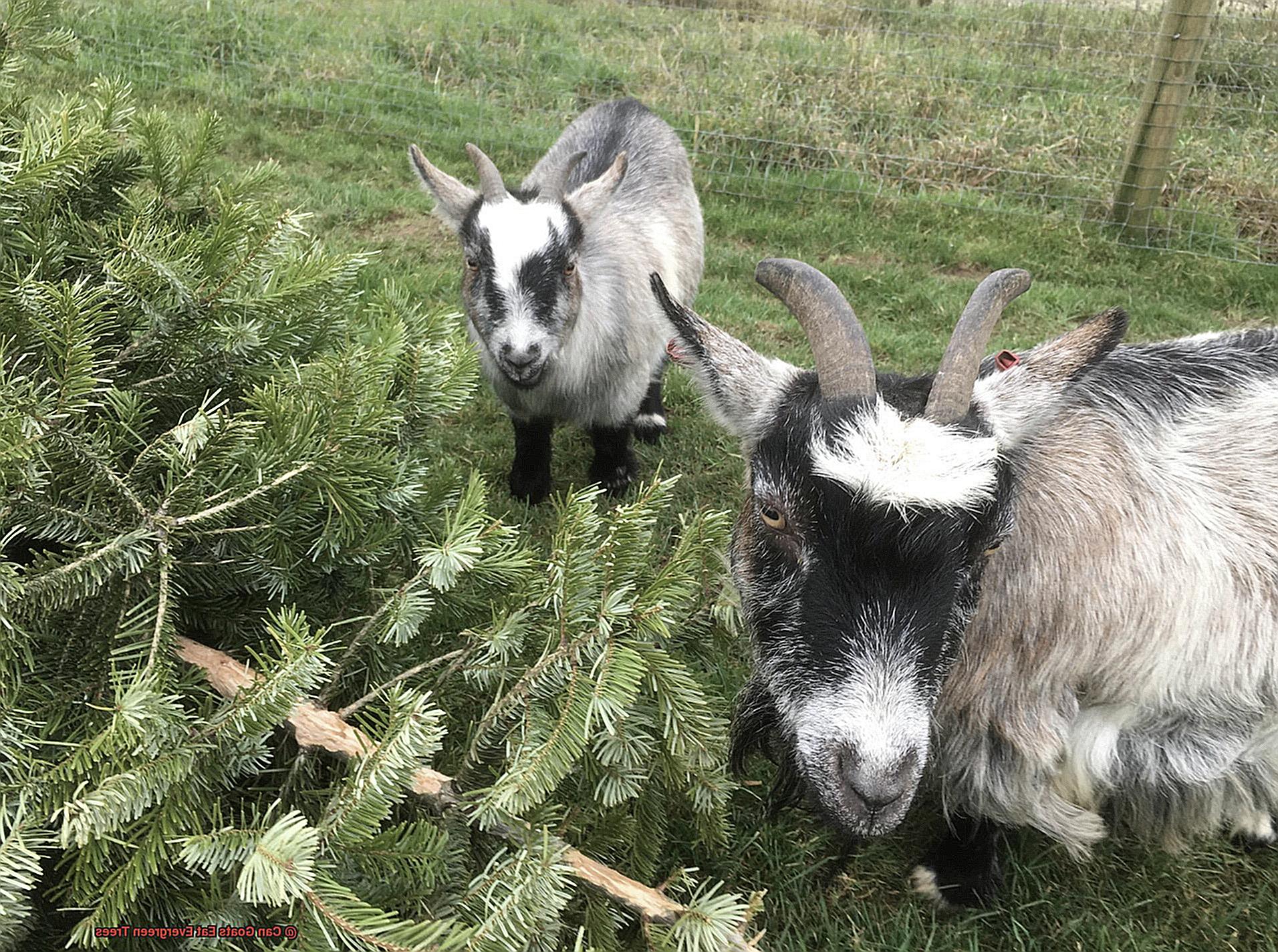
However, as with any new food, it is essential to introduce them slowly and monitor your goat’s response.
So, pine and fir trees are an excellent source of nutrition for goats.
Limiting Access to Evergreen Trees
One crucial aspect of goat care is limiting their access to evergreen trees.
While goats may enjoy nibbling on the needles and bark of these trees, it’s not recommended as a regular part of their diet. Evergreen trees contain oils and resins that can be harmful to goats if consumed in large quantities.
Luckily, there are several strategies you can use to keep your goats safe from evergreen trees. One approach is to fence off the area around the trees, preventing your goats from getting too close.
Alternatively, you can use deterrents such as motion-activated sprinklers or noise-making devices to discourage your goats from grazing on the trees. However, it’s important to remember that goats are experts at escaping enclosures and finding their way into forbidden areas.
That’s why it’s vital to keep a close eye on your goats and monitor their grazing habits regularly. By doing so, you can ensure they’re not consuming any harmful substances.
In addition to limiting access to evergreen trees, providing your goats with a well-rounded diet is essential for their health and happiness. This includes giving them fresh water, hay, and a mix of grasses and grains.
A balanced diet will help keep your goats strong and thriving for years to come. In conclusion, taking steps to limit your goats’ access to evergreen trees is crucial for their safety and wellbeing.
Monitoring Goats’ Behavior and Health
One of the most significant aspects of goat care is monitoring their behavior and health.
A crucial factor to consider is their diet. Goats are known for their ability to eat a wide variety of plants, but not all plants are safe for them to consume.
Evergreen trees, for instance, can be toxic if ingested in large amounts. These trees contain a compound called tannins, which can cause digestive issues and even lead to kidney damage in goats.
However, not all evergreen trees are harmful to goats. It’s best to err on the side of caution when introducing new vegetation into their diet.
In addition to watching their diet, it’s essential to keep a close eye on your goats’ well-being. Signs of illness or distress may include decreased appetite, lethargy, coughing, diarrhea, and abnormal behavior such as excessive scratching or head shaking.
It’s crucial to schedule regular check-ups with a veterinarian. This way, potential health issues can be caught early on, and your goats can receive the proper care and nutrition they need to thrive.
To promote overall health and well-being in goats, it’s essential to provide them with a clean and comfortable living environment that includes access to fresh water and adequate space for exercise.
ZdZIlG_fxuk” >
Conclusion
To sum it up, the question of whether goats can chow down on evergreen trees is not a straightforward one.
While some evergreens like pine and fir boast medicinal properties and are safe for goats to nibble on in moderation, others like yew trees contain toxic alkaloids that can be deadly if ingested. As a conscientious goat owner, it’s crucial to do your homework on the specific type of evergreen tree before granting access and keep a close eye on your goats’ behavior and health.
Furthermore, restricting their exposure to evergreen trees through fencing or deterrents is essential for their well-being and safety. To keep your goats healthy and thriving, it’s important to provide them with a well-rounded diet that includes fresh water, hay, grasses, grains, and occasional treats such as pine or fir needles.
Evergreen trees serve as an important source of greenery and shelter for animals year-round, including goats.

